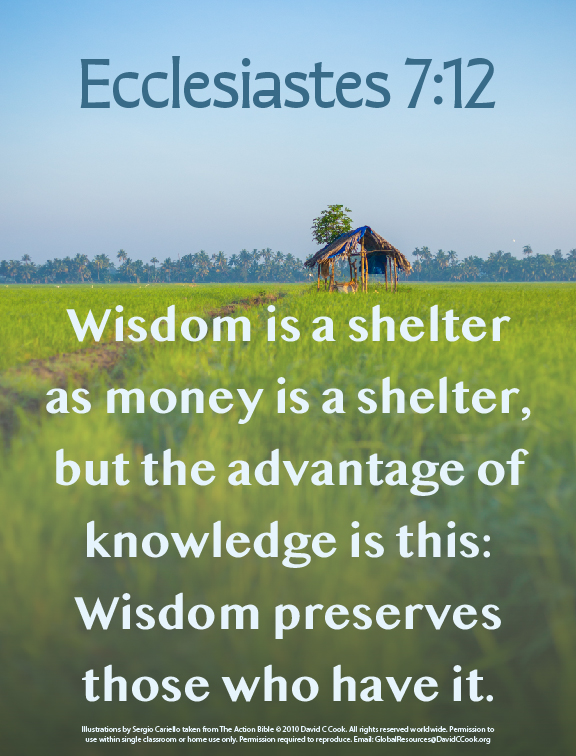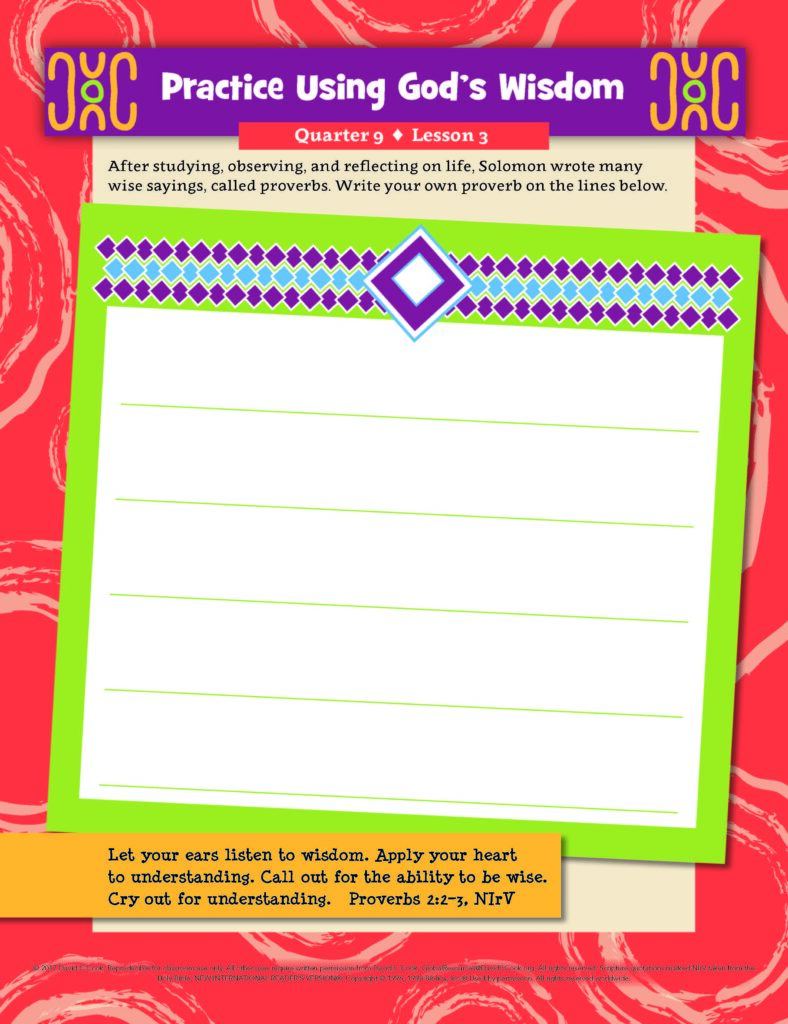During the lesson, the information for you to know is written in regular type, and what we suggest speaking or reading aloud to children is in bold. All resources for this lesson, including the Teacher Guide, Student Page, Family Connection Card, and other resources can be downloaded in a ZIP file by clicking on the following link:
In some lessons you will find "resource articles." These are articles written by experts from around the world to help equip you for your work with children and adolescents. Share them with parents or guardians if you consider it appropriate.
Tear out the Proverbs list from the end of this lesson. Tear or cut apart the different topics so you will have 1 topic for 7 different groups.
My son, if you accept my words and store up my commands within you, turning your ear to wisdom and applying your heart to understanding— indeed, if you call out for insight and cry aloud for understanding, and if you look for it as for silver and search for it as for hidden treasure, then you will understand the fear of the Lord and find the knowledge of God. For the Lord gives wisdom; from his mouth come knowledge and understanding.
Proverbs 2:1–6
God’s wisdom is so valuable that you should seek it as a treasure. Ask Him for His wisdom and then work to understand what He has given to you. Read the verses from Proverbs 2. Notice all the things God calls us to do: accept His words, store up His commands, listen to wisdom, apply and understand it, ask for insight and understanding, look for it as hidden treasure. Wisdom does not come without work on our part. Seek God and He will help you.
Let the families know that their children will be learning skills to help them gain wisdom. Family members can ask their children to share the skills they learned: studying, observing, and reflecting.
Teacher Tip: If possible, email or text the Family Connection Card to the families of your students.
Greet the children with a high five today to let them know you are excited they are in class. Ask them about their wisdom situations from the previous lesson.
Once everyone has arrived, divide the children into 3 groups. Give each group one of the leaves you brought. Tell them their groups have 1 minute to discover everything they can about their leaves. They should handle them carefully as they will use them again later in the lesson.
After a minute, ask someone from each group to share what the group discovered about their leaf.
What did you discover about your leaf in just 1 minute?
You did not have much time to study your leaf. When we have time to study something, we can learn more about it. Today we will learn more about wisdom and how to develop habits that will help us to grow in wisdom.
Set aside the leaves for use at the end of the lesson. Have the children remain in their groups.
Remember that when he became king, Solomon asked God to give him wisdom. That was a very good thing to do. God is the source of all wisdom. So if you want to be wise, you should always start by asking God for wisdom.
What do you think Solomon did after he asked God for wisdom? Do you think he immediately became wise? No! Solomon needed to develop his heart and mind in order to become wise. Let’s learn some of the wise habits Solomon practiced to develop his heart and mind. We will learn about 3 habits Solomon used: study, observation, and reflection.
If you are using the Memory Verse Poster, show it to the students.
Wisdom is a shelter as money is a shelter, but the advantage of knowledge is this: Wisdom preserves those who have it.
Ecclesiastes 7:12

Solomon studied, observed, and reflected. In these ways, with God’s help, he became wise. Kings, queens, and other important people travelled from all over the world to visit him. They wanted to hear his great wisdom.
Solomon wrote about many interesting and important subjects that he studied, observed, and reflected on. For example, he wrote about friendship, money, honesty, happiness, anger, helping others, arguing, and pride.
Reminder: All resources are available for download at the end of this lesson.
Listen to some of the proverbs Solomon wrote on these topics.
Friendship
Whoever wants to show love forgives a wrong. But those who talk about it separate close friends.
Proverbs 17:9, NIrV
Money
You should want a good name more than you want great riches. To be highly respected is better than having silver or gold.
Proverbs 22:1, NIrV
Honesty
An honest witness does not deceive, but a false witness pours out lies.
Proverbs 14:5
Anger
Whoever is patient has great understanding, but one who is quick-tempered displays folly.
Proverbs 14:29
Helping Others
Whoever shuts their ears to the cry of the poor will also cry out and not be answered.
Proverbs 21:13
Arguing
An angry person stirs up fights. And a person with a bad temper commits many sins.
Proverbs 29:22, NIrV
Pride
If you are proud, you will be destroyed. If you are proud, you will fall.
Proverbs 16:18, NIrV
Which proverb did you like the most? Why?
Optional: If you are using The Action Bible, have the children read the story on page 357.
Give each of the 3 groups a different leaf from the one they had earlier.
Let’s try using these 3 habits of study, observation, and reflection with these leaves. You will have 3 minutes to study, observe and reflect on your leaf. It is still not a lot of time, but try and discover as many things about your leaf as you can. Be sure that every team member adds something to your discussion. What do you notice? Here are some questions to help you:
After time is up, ask each group to share what they discovered as they studied, observed, and reflected on their leaves. Congratulate the groups for using these good habits.
God wants you to ask Him for wisdom. He wants you to think creatively and make good decisions. He wants you to practice using wisdom. One way you can become wiser is to study, observe, and reflect on something—then write your own proverb about what you discovered!
Think over the things you have learned about wisdom. We will take a few minutes to write our own proverbs. What wise thing do you know that you can share with a friend? Your proverb can be short or long.
Pause for a couple minutes for the children to think of their own proverbs. Then ask for volunteers to share their proverbs with the class. If you do not have much time or have a large number of children, have them share their proverbs with 1 other child.
Optional: If you are using the Student Pages, the children can write their proverbs on them.

Close class by speaking this blessing based on Proverbs 1:1–3 over the children.
Blessing: May the Lord help you learn and grow in wisdom for understanding and living life in a right and good way.
Lead the children in singing this quarter’s song, if possible. (soft return here)
Life on Life ©2020 David C Cook. Reproducible for home or classroom use only. All other uses require written permission from David C Cook [email protected]. All rights reserved.